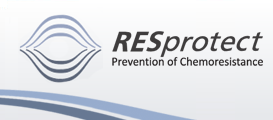| RESprotect grants License for RP101 to SciClone |

|

|

|
RESprotect grants U.S. and Canada License for its anti-cancer drug RP101 to SciClone PharmaceuticalsDresden, Germany – May 7, 2007 – RESprotect GmbH today announced that it has granted the exclusive rights in the United States and Canada to develop and commercialize RP101, a clinical-stage compound for the treatment of cancer, to SciClone Pharmaceuticals, Inc. (Nasdaq:SCLN). SciClone acquired the rights from Resistys, Inc., a wholly-owned subsidiary of Avantogen Oncology, Inc. (Nasdaq: AVTOE), which acquired the rights from RESprotect in 2004. As part of the transaction RESprotect GmbH will receive about 4.5% of common stock in Avantogen Oncology, Inc.07. Mai 2007. Under the terms of the agreement, SciClone will pay approximately $1.7 million in upfront fees, a $1.3 million milestone payment upon initiation of a phase 2 clinical trial, post phase 3 success-based regulatory and commercial payments up to $22 million, and royalties on future sales to RESprotect GmbH and Avantogen Oncology, Inc. SciClone Pharmaceuticals, Inc. will fund all future clinical trial costs for U.S. and Canadian regulatory purposes necessary for the successful commercialization of RP101 program. said Prof. Rudolf Fahrig, Chief Executive Officer and founder of RESprotect GmbH. Friedhelm Blobel, Ph.D., President and Chief Executive Officer of SciClone Pharmaceuticals, Inc. added “We are excited to complete this development and commercialization agreement. Our goal is to initiate a U.S. phase 2 study using RP101 to treat late-stage pancreatic cancer by the fourth quarter of 2007“. RP101’s potential efficacy for treating cancer patients was discovered by the founder of RESprotect, Prof. Fahrig. RP101 has been evaluated in combination with cytostatic agents such as gemcitabine which is used to treat pancreatic, lung, ovarian and breast cancer patients. Although approved in several European countries for antiviral indications, RP101’s potential efficacy to combat chemoresistance and improve chemosensitivity constitutes a new clinical use for RP101 which is protected by three use patents of RESprotect. In two separate, unrelated phase 1 clinical trials with late-stage pancreatic cancer patients, RP101 was used in combination with gemcitabine, the current standard of care, or gemcitabine + cisplatin. The results were published recently (Fahrig, et al., Anti-Cancer Drugs 17, 2006, 1045-56). In summary, RP101 co-treatment approximately doubled median survival. Moreover, four or five times more patients with far metastases (stage IV) survive one year or longer in comparison to patients treated with chemotherapy alone. About RESprotect: RESprotect GmbH, a spin-out of the Fraunhofer-Society, is a privately owned Biotech Company located in Dresden/Germany. RESprotect is focusing on the inhibition of chemoresistance and the enhancement of chemosensitivity. In contrast to the well known efforts to circumvent or decrease existing chemoresistance, this basic approach is unrivaled.Chemogenomics, the approach of RESprotect, focuses on the application of small synthetic molecules, which elicit favourable phenotypic changes. The combination with genomic tools concentrating on specific biological pathways allows a better understanding of the broader effect of a drug. By so doing, it is possible to discover drugs that target the cause of a disease rather than its symptoms. RESprotect's compounds are given additionally to standard chemotherapy. Chemotherapy relies on the induction of apoptosis of tumor cells, which is the main anticancer mechanism. One major problem in chemotherapeutic treatment is the induction of chemoresistance, which antagonizes the apoptosis of cancer cells. The chemogenomics approach of RESprotect resulted in the identification of a number of validated targets contributing to the development of chemoresistance by antagonizing apoptosis. RP101, the Company's first small molecule drug candidate, suppresses the overexpression of apoptosis-antagonizing gene products induced by cytostatic drug treatment.
Contact:
Prof. Dr. Rudolf Fahrig CEO RESprotect GmbH – Prevention of Chemoresistance Fiedlerstr. 34 D - 01307 Dresden Germany AG Dresden HRB 18568 Telefon + 49 351 4503201 Telefax + 49 351 4503210 email: This e-mail address is being protected from spam bots, you need JavaScript enabled to view it For more information visit www.resprotect.com and www.rp101.com .
|


